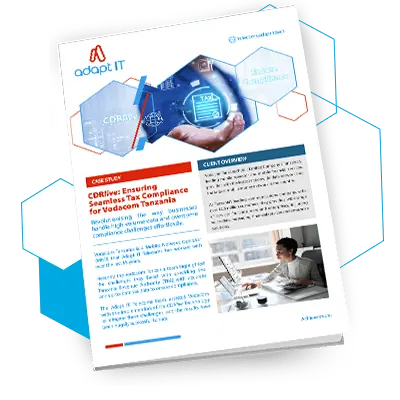In the rapidly evolving Telecommunications landscape, cloud migration has emerged as a transformative force for Telcos. Telcos are leveraging cloud technology to enhance competitiveness, meet customer demands, and drive efficiency. As Telcos navigate this understanding, the Return on Investment (ROI) of cloud migration becomes essential. Below, we explore the significance of quantifying ROI for Telcos considering a transition to the cloud and outline vital components, challenges and the need to partner with cloud migration experts like Adapt IT Telecoms.
Table of Contents
Toggle
The State of Cloud Migration in Telecom
Telcos are currently in a transformative era where digital technology like the cloud is being utilised to enhance competitiveness, meet evolving customer demands, and drive efficiency. Cloud migration offers Telcos a pathway to not only meet but exceed the traditional benchmarks of service delivery and innovation.
By embracing cloud technologies, Telcos can unlock unparalleled scalability and agility. This strategic shift not only positions Telcos to better cater to the expectations of today’s digital-savvy consumers but also provides the tools required to successfully navigate the future landscape of Telecommunications.
How much of an impact does cloud technology have on the sector? The answer is a significant impact. According to a recent report by Spherical Insights, the global telecom cloud market is expected to reach USD 108.7 billion by 2030, at a CAGR of 20.9% during the forecast period 2021 to 2030. This growth is primarily associated with factors such as a decrease in the cost of billing, increased mobile penetration, and a rise in the desire for bundled billing solutions. Customers who pay for their services in advance make up the largest portion of the market, and more than 80 per cent of Global System for Mobile Communication (GSM) subscribers throughout the world use cloud billing systems.
With cloud migration set to impact the Telecommunications industry over the next few years, it is essential to understand ROI and quantify the benefits of cloud migration for Telcos.
Understanding ROI in the Context of Cloud Migration
For Telcos, the relevance of ROI extends beyond financial calculations. It includes strategic positioning, competitive advantage, and long-term sustainability.
With the capital-intensive nature of the telecoms industry and the rapid pace of technological change, technology investments must not only provide revenue returns but also ensure the company remains agile, efficient, and able to meet evolving customer expectations. Cloud migration ticks all of these boxes. When assessing the ROI of cloud migration, several components and benefits must be examined. These include the following:
- Operational Efficiency – Cloud computing significantly enhances operational efficiency through automation, offers better resource management, and reduces downtime. These improvements lead to lower operational costs and free up valuable resources that can be redirected towards innovation and development efforts, further enhancing ROI.
- Revenue Growth – Cloud migration can indirectly contribute to revenue growth by enabling Telcos to launch new, innovative services rapidly. Cloud-based platforms facilitate faster development and deployment of services, improving time-to-market and the ability to adapt offerings in response to customer demand or competitive pressures.
- Scalability and Flexibility – Cloud technology allows Telcos to scale services up or down based on demand, avoiding over-provisioning and underutilisation of resources. This scalability ensures that companies only pay for what they use, which can positively impact ROI by aligning costs more directly with revenue-generating activities.
- Enhanced Security and Compliance – Cloud services offer advanced security features and compliance certifications, potentially reducing the costs associated with data breaches and regulatory non-compliance. While these savings might be difficult to quantify upfront, they play an essential l role in minimising risk and protecting the company’s bottom line.
- Customer Satisfaction and Retention – Although not directly quantifiable in the short term, improvements in service reliability, performance, and innovation can lead to higher customer satisfaction and retention rates, contributing to long-term revenue stability and growth.
From the above, it is clear that cloud-based solutions offer Telcos several direct and indirect benefits. Direct benefits include scalability and agility, while cloud migration can indirectly boost customer satisfaction by providing reliability and unlocking innovation potentials with advanced technologies.

Measuring ROI for Telcos – A Step-by-Step Approach
Now that we have highlighted the components and benefits associated with ROI it is important to understand how to calculate and measure ROI. Calculating the ROI for cloud migration in this sector involves a detailed analysis of costs and benefits, both tangible and intangible. Here’s how this is often approached:
- Identifying and quantifying upfront and ongoing costs: Initially, Telcos must account for all expenses related to the migration. Upfront costs typically include data migration expenses, software re-architecture or adaptation, staff training, and any investments in new tools or services required for the cloud environment. Ongoing costs encompass cloud service provider fees, which might vary based on the consumption model (e.g., pay-as-you-go), as well as operational costs such as ongoing training, support, maintenance, and possibly increased cybersecurity measures.
- Estimating the monetary value of direct and indirect benefits: The direct benefits are easier to quantify and often include reduced infrastructure costs, lower operational expenses due to automation and operational efficiencies, and decreased downtime. Indirect benefits, though more challenging to quantify, are equally important. These can include enhanced customer satisfaction due to improved service reliability and agility in service updates or new offerings. To estimate these, Telcos must analyse historical data on customer churn and acquisition rates pre- and post-migration, project revenue increases from new services enabled by cloud technologies and forecast revenue savings from operational efficiencies.
By systematically addressing these elements, Telcos can construct a comprehensive view of the financial impact of cloud migration, assessing both the immediate and long-term returns against the costs.
Addressing Challenges and Mitigating Risks Through Professional Expertise for Successful Migration
Before Telcos embark on the journey of cloud migration, they often encounter a series of challenges that require careful navigation. These include complexities in integrating legacy systems, data security concerns, compliance with regulations, and ensuring that the workforce is adequately prepared for the transition.
The decision between different cloud options, such as hybrid or on-premises solutions, also presents a challenge, as each choice carries its own set of upfront costs and ongoing operational expenses. For example, hybrid models offer flexibility but may require sophisticated management, potentially increasing implementation costs.
To effectively address these challenges and mitigate the associated risks, Telcos must conduct comprehensive risk assessments, identify potential pitfalls, and develop robust mitigation strategies. These strategies require extensive planning, transparent communication, and vigilant monitoring throughout the migration process.
Recognising the complexity of cloud migration, many Telcos turn to professional expertise from partners like Adapt IT Telecoms. Adapt IT Telecoms offers tailored support services to help Telcos maximise ROI through cloud migration. These Telco cloud services include infrastructure assessment, migration strategy development, and ongoing management, ensuring a seamless transition and optimal utilisation of cloud resources. By partnering with experts like Adapt IT Telecoms, Telcos can overcome challenges, minimise risks, and unlock the full potential of cloud technology to drive business growth and innovation.
Conclusion
It is clear that cloud migration offers Telcos unparalleled scalability and agility. However, migrating to the cloud is not without challenges. To take full advantage of the benefits associated with cloud migration, Telcos must navigate several complexities, including legacy system integration, data security, and workforce readiness. By partnering with experts in cloud migration like Adapt IT Telecoms, Telcos can effectively navigate these challenges, mitigate risks, optimise ROI, and ensure a seamless transition. Through strategic planning and expert guidance, Telcos can harness the full potential of cloud technology to drive innovation and success in the Telecommunications sector.
APN-as-a-Service is a reliable solution to business continuity and remote working

As the Product Manager of Advanced Analytics within the Adapt IT Telecoms division, I bring 16 years of Telecommunications expertise to the table. Over the past 8 years, my focus has been on Product Development. My responsibilities encompass identifying customer needs, monitoring industry trends, and driving our Advanced Analytics strategy. I’m deeply passionate about leveraging big data for analytical insights and product evolution through machine learning and AI. My experience extends to Mobile Network Events, Mobile Financial Services, and supplementary services.




